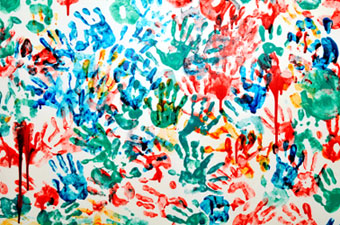Fabric Painting
Fabric painting is tons of fun for both children and adults. Bright colored paints and a semi-steady hand can transform a plain t-shirt into a real fashion statement. Better, they enable children to express themselves creatively and then wear their statement again and again. Here’s how to get started with fabric painting.
Supplies:
- T-shirt, sweatshirt, canvas bag, or even a pillow case
- Fabric paint
- Paint brushes, sponges
- Cardboard
- Paper plate or pie tin to hold paint
 Start with a simple t-shirt. White isn’t the only option, any color will do. The key is to make sure the fabric is at least 50% cotton. Natural fabrics respond to and adhere to fabric paint better than synthetic fabrics. Once you get your t-shirts home, test a small area to make sure the paint adheres properly and doesn’t bleed. Enthusiasts also recommend a tight weave as paint will cling better and the color intensity will be brighter.
Start with a simple t-shirt. White isn’t the only option, any color will do. The key is to make sure the fabric is at least 50% cotton. Natural fabrics respond to and adhere to fabric paint better than synthetic fabrics. Once you get your t-shirts home, test a small area to make sure the paint adheres properly and doesn’t bleed. Enthusiasts also recommend a tight weave as paint will cling better and the color intensity will be brighter.
Many recommend washing the fabric first. This removes any sizing from the material which can interfere with the painting process. If you choose to wash the fabric first, be sure to skip the fabric softener.
Fabric paint comes in a variety of forms. For children, the fabric paint which comes in bottles with easy to apply nozzle tops makes application easy. However, sponges and paint brushes can add texture and a higher degree of detail. If you’re using bottles with an applicator tip, store them upside down to prevent bubbles from interfering with the lines of your design. Glitter can be added when paint is wet to add an extra sparkle to the project.
Sometimes children have an idea of exactly what they want and all you have to do is give them the tools and watch them go. Other children may benefit from a pattern or design ideas. Cookie cutters provide great stencils, cups make perfect circles and a ruler can help a child make straight lines. Letters can be created quickly and easily with stencils. Coloring books with large pictures can also work very well as templates. Of course for ultimate fun painted hands make for fantastic fun and fashion.
When children are ready to paint, fabrics have been tested and prepared and designs have been planned out it is time to slide a piece of cardboard underneath the material being painted. If a t-shirt or sweatshirt is being painted the cardboard should be inserted inside to keep paint from bleeding onto the other side. The same holds true for pillow cases and bags. If you’re painting a napkin or something with only one layer, cardboard positioned underneath will protect the table surface.
Follow the directions on the paint for drying times. This is often difficult for children who want to be able to finish the other side of their project or who are ready to wear their masterpiece. Plan to have an activity after painting or explain the process ahead of time so children won’t be disappointed. This is a fun project!
| Pattern Categories Browse the categories to help you find the patterns you're looking for. |
||







